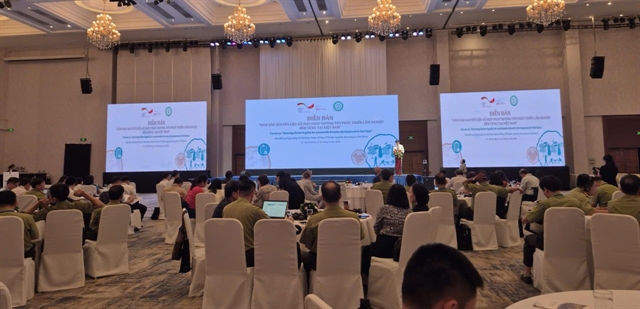 Economy
Economy


|
| A forum titled “Ensuring Timber Legality for Sustainable Forestry Development in Việt Nam” is held on September 11-12 in HCM City. |
By Tố Như
HCM CITY — Việt Nam is reaffirming its commitment to sustainable forestry and the legal timber trade as it strengthens national and international frameworks to ensure the legality of its wood products.
On September 11–12, the Department of Forestry and Forest Protection under the Ministry of Agriculture and Environment, in collaboration with the German Development Agency (GIZ), hosted a pivotal forum titled 'Ensuring Timber Legality for Sustainable Forestry Development in Việt Nam.'
The forum brought together key stakeholders from government agencies, industry associations, businesses, local communities and international partners.
It marked a significant step in Việt Nam's journey to integrate more deeply into the global timber market while promoting transparency and sustainability across its supply chains.

|
| Director General Trần Quang Bảo speaks at the forum. |
“This forum provides an important opportunity for government agencies, businesses, timber associations, social organisations, local communities and international partners to exchange views, share experiences and propose solutions to ensure the legality of timber in Việt Nam,” said Director General Trần Quang Bảo.
“We especially appreciate the support of the German people and Government through the Deutsche Gesellschaft für Internationale Zusammenarbeit (GIZ) in implementing the Voluntary Partnership Agreement on Forest Law Enforcement, Governance and Trade (VPA FLEGT) – a strong example of multistakeholder cooperation and our shared commitment to building a timber industry that is legal, transparent, sustainable and responsible.”
Signed in 2018, the VPA/FLEGT between Việt Nam and the European Union (EU) laid the foundation for the Vietnam Timber Legality Assurance System (VNTLAS). This system aims to enable Việt Nam to issue FLEGT licences – effectively a 'green passport' for direct access to the EU market.
Deputy Director Nguyễn Hữu Thiện emphasised that one of the major challenges facing the industry is the lack of robust digital tools for tracing timber origins, particularly with imported wood. Despite Việt Nam’s classification mechanisms by country and region, traceability remains an issue due to limited oversight of documentation from foreign exporters.
To address this, Việt Nam aims to enhance bilateral cooperation with supplier countries and strengthen digital traceability systems across the supply chain – a move seen as essential for achieving legal timber transparency.

|
| Jens Schmid-Kreye, German embassy first secretary, speaks at the forum. |
“As Việt Nam and Germany celebrate 50 years of diplomatic relations in 2025, this forum also reflects our strong partnership in sustainable development," said German embassy first secretary Jens Schmid-Kreye.
"Germany is proud to support Việt Nam in strengthening timber legality and sustainable forestry through our joint technical cooperation to develop enabling policy frameworks, capacity development and knowledge transfer, and the development of practical digital tools."
He noted that forestry is a priority in the Germany–Việt Nam bilateral cooperation portfolio, which includes nearly 100 million euros in joint investments focused on forest management, protection and sustainable timber value chains. A new financial cooperation project is underway to support the implementation of the VPA/FLEGT, building on the achievements of the current technical cooperation programme.
First Counsellor at the EU Delegation to Việt Nam Cyril Loisel said the EU and Việt Nam share a strong cooperative relationship, particularly in trade, highlighted by the Free Trade Agreement that entered into force in 2020.
A key part of this partnership is our joint commitment to ensuring the timber and timber products we trade are legal and sustainable. This is based on the VPA FLEGT entering into force one year earlier in June 2019.
“Since June 2019, significant work has been done to achieve an operational Vietnam Timber Legality Assurance System," said Loisel. "This system, with all its elements, is crucial for a future FLEGT licensing scheme, which will ensure that only legal, verified products from Việt Nam enter the EU market.”
Vice President and General Secretary of the Handicraft and Wood Industry Association of Ho Chi Minh City (HAWA) Nguyễn Hoài Bảo noted that increasing global regulations offer opportunities rather than just obstacles.
“Certified products – whether FSC, PEFC or FLEGT – offer a distinct competitive edge. We view compliance as both a responsibility and a business advantage,” he said.
Since 2020, HAWA has signed commitments on sustainable development and responsibility, requiring members to use only legal wood. Leading enterprises such as Scansia Pacific, Woodsland and Tavico are actively partnering with forest farmers to secure certified timber supplies.
“We maintain complete documentation to assure clients of our timber’s legality. It’s about more than compliance — it’s about building trust,” said Deputy General Director of Moc Phat Service-Trading JSC Phạm Duy Doanh.
According to the Department of Forestry and Forest Protection, Việt Nam’s forestry production has seen an average annual growth rate of 4.7 per cent. In 2024, wood and forest product exports reached US$17.3 billion, accounting for 30 per cent of Việt Nam’s total agricultural exports and generating a trade surplus of $14.6 billion.
Việt Nam’s wood industry includes 6,200 processing and exporting enterprises, 300 craft villages and 16,000 household-scale workshops.
Annually, the country produces about 31 million cubic metres of wood, with planted forests contributing 23.2 million cubic metres – covering 75 per cent of domestic processing needs. Vietnamese wood products are now exported to nearly 150 countries, positioning Việt Nam as the world’s second-largest furniture exporter, behind only China.
By 2030, Việt Nam aims to reach $23–25 billion in wood product export turnover, with 80 per cent of raw material demand met by domestic sources. Achieving this will require continued legal reforms, increased digitalisation and strengthened international cooperation. — VNS




